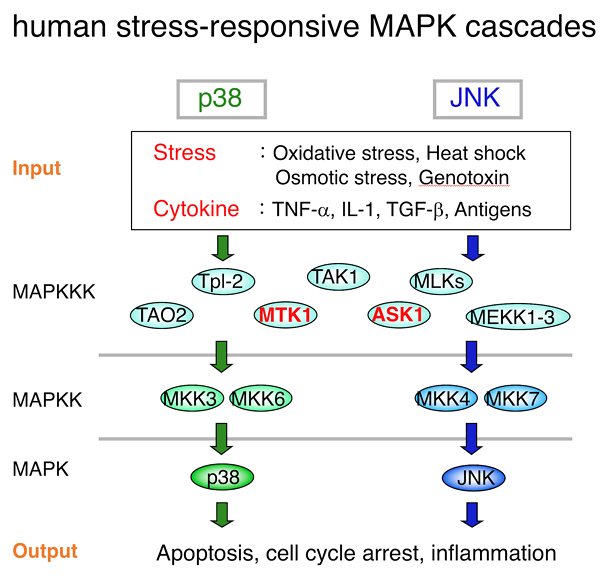Regulation of cell-fate decisions by stress-responsive p38/JNK MAPK signaling pathways

Date
Location
Description
Dear All,
Cell Signal Unit (Yamamoto Unit) would like to inform you of a seminar by Dr. Mutsuhiro Takekawa, Institute of Medical Science, The University of Tokyo.
-----------------------------------------------------------
Date: Wednesday, April 18, 2018
Time: 14:00-15:00
Venue: C016, Level C, Lab 1
-----------------------------------------------------------
Speaker:
Dr. Mutsuhiro Takekawa, Institute of Medical Science, The University of Tokyo
Title:
Regulation of cell-fate decisions by stress-responsive p38/JNK MAPK signaling pathways
Abstract:
Mammalian cells are frequently exposed to a variety of environmental stresses, such as ultraviolet rays, ionizing radiation, genotoxins, and oxidative stress. In coping with the barrage of these and other stresses, multi-cellular eukaryotic organisms have developed a strategy as to how damaged cells will respond to stresses. In general, if the intensity of the damage is moderate, the cell will seek to repair the damage. If, however, the damage to a cell is too severe to be repaired, the affected cells are eliminated by apoptosis. This cell death reduces the risk to the organism as a whole, such as development of a cancer. Such a crucial decision between survival and death is, at least in part, mediated by the stress-activated p38 and JNK MAPK pathways (collectively called SAPK pathways). SAPKs are a group of serine/threonine protein kinases that convert extracellular stress stimuli into diverse cellular responses, including apoptotic cell death and cytokine production, through phosphorylation of specific target proteins. Perturbation of these critical signaling systems is involved in a variety of life-threatening diseases. Therefore, these signaling systems are of clinical importance. Recent progress in the identification of molecules that participate in the SAPK pathways has provided new insights, not only into the molecular basis of the cellular response to environmental stress, but also into the etiology of human diseases including cancer and inflammatory diseases. In this seminar, I will review our resent findings regarding regulatory mechanisms of the SAPK signaling pathways, with particular emphasis on cellular response to oxidative stress.
Host:
Prof. Tadashi Yamamoto
We hope to see many of you at the seminar.
Best regards,
Yuki Nakagawa
Research Unit Administrator
Cell Signal Unit
Subscribe to the OIST Calendar: Right-click to download, then open in your calendar application.



